- Home
- Victor Gischler
Stay Page 8
Stay Read online
Page 8
Jeff whistled and gawked at the Escalade. “Holy fucking shit, man. Amy sort of gave us the short version of what happened but … damn.”
“It could have been worse,” David said.
“Hell yeah, you could have been killed.”
“Yes.”
“Have you called the police?”
“Not yet,” David said.
Jeff gave him the fish-eye. “Well … don’t you think you’d better?”
David looked up and down the street. No cars coming. Nothing yet. David had neither the time nor the desire to get into a lengthy debate with Jeff. He needed to be as firm and as direct about this as possible. Jeff needed to understand and understand now.
“There were police guarding our house,” David said. “They left only a few minutes before this started. It was a bailiff who shot Amy’s boss at the courthouse. The line between good guys and bad guys is a bit fuzzy at the moment. So here’s what we’re going to do. We’re going to make sure the people we care about are safe first, and then we’ll talk to the appropriate authorities to get this straightened out.”
“Damn, I mean…” Jeff scratched his head. “I mean, hell, you guys can hide out here of course. We’re family. Or if you need to leave the kids—”
“I appreciate that, Jeff,” David said. “But that’s not good enough. I’m going to need you to pack up your family and mine and drive to Disney World. I’ve already made the reservations, and it won’t cost you a dime.”
“Disney World.”
“Yes.”
“That’s in Florida.”
“Yes,” David said. “Far away.”
Jeff shuffled his feet, rubbed the back of his neck. “Damn, David, I’m store manager. We do our schedules pretty far in advance and I can’t just … you know … take off.”
David sighed and nodded.
Jeff didn’t understand that his whole world had just changed. It needed to sink in but wasn’t happening fast enough.
David put a hand on Jeff’s shoulder. Gently. He guided him around to the rear of the Escalade and gestured to the vehicle. “Those are bullet holes. From a nine millimeter submachine gun. These are people who wanted my wife dead and didn’t care if there were children in the car when they started shooting. They are targeting her specifically, for something she knows or something they did, but they know all about her and came after her. That means they know who her sister is, too, and where you live. They haven’t finished the job, and that means they’ll come looking. They’ll come right here to your house. If they think you might have useful information, they’ll make you tell it. It won’t matter if you don’t know anything. They’ll need to make sure. If they think hurting Elizabeth will make you talk, then that’s what they’ll do. And they won’t leave any witnesses. It doesn’t matter if they’re children. They won’t care.”
The color drained from Jeff’s face.
“It’s not fair. You didn’t do anything to make this happen, but that doesn’t matter. It’s happening anyway. Now here’s what you’re going to do.” David spoke slowly, calmly. “You’re going to call your assistant manager or whoever’s next in line and tell him he’s on the job. Do not tell him you’re going to Florida. Make up a lie. Keep it simple. Then you’re going to drive yourself and both of our families to Florida. If Brent or Anna asks where Daddy is you’re going to tell them everything is fine and that I’m just taking care of some business. Then you’re going to see Mickey or eat ice cream or whatever is fun and will keep them happy. I’ll call Amy every day to update you guys. Understand?”
“I…” He seemed to have trouble finding breath. “I guess I can pack up and then first thing in the morning—”
“I need you on the road in ten minutes.”
Jeff swallowed hard, nodded.
David squeezed his shoulder. “I’m trusting you with everything, Jeff. My wife and kids. You can do this.”
Jeff nodded again. “Ten minutes.”
* * *
David sat behind the wheel of the Escalade and watched Jeff toss the last piece of luggage into the back of his pickup. He’d already kissed Anna and Brent good-bye, and now he watched from his parking spot on the street to make sure they got off okay. He drummed his fingers on the steering wheel, willing his in-laws to move faster.
Amy walked toward him, the bag she’d brought from home slung over her shoulder. She climbed in the passenger side and shut the door. She looked straight ahead, specifically avoiding eye contact with her husband.
“What do you think you’re doing?” David asked.
“Coming with you.” Amy said. “Elizabeth can handle Anna and Brent.”
“I don’t think that’s a good idea,” David said.
She offered him a withering look. “You don’t have the security codes to my building and office.”
“You could give them to me.”
“What’s the senior administrative assistant’s name at the DA’s office?”
“I don’t know.”
“Who runs the bailiff’s office and what are the watch captain’s names?” Amy asked.
“I don’t know.”
“This is a DA problem on DA turf,” Amy said. “This isn’t happening without me. I’ll admit being shot at was new. You can handle that part. But I’m going.”
They looked at each other deadpan.
David broke eye contact first, turned his head to watch Jeff’s truck back into the street. Jeff honked and waved out the window before pulling away.
Amy took her phone out of her bag. “First thing is to figure out who in my office to call. Somebody trustworthy.”
“Put that on hold. Think about it,” David said. “First thing we find a safe place and regroup.”
“Okay then,” Amy said. “So drive already.”
David shifted the Escalade into gear, leaving the quiet neighborhood and finding his way back to the freeway. They were over the bridge and into the city when David’s smartphone rang.
He didn’t recognize the number but answered it anyway. “Hello?”
“You’re making a lot of noise out there, man.”
“Charlie.”
“Are you near a TV?” he asked.
“No.”
“Never mind,” Charlie said. “I’ll send the video to your e-mail.”
“Not to mine,” David said. “Send it to my wife’s e-mail. Get a pencil. Write it down.”
“It’s okay. I already have it.” Charlie hung up.
Of course.
They hit Midtown and crossed to the west side. The wind washed through the SUV. David felt conspicuous driving around in a vehicle with practically no windows, full of bullet holes, dents. Nobody much noticed. Welcome to New York City.
“Where are we going?” Amy asked.
“I know somebody.”
Three blocks later, he turned into a hotel parking garage and backed the Escalade into the darkest most remote corner he could find. David grabbed his duffel and Amy her bag and they found the stairwell and took it up to the lobby.
They stood in line at the front desk, waiting behind a half-dozen people looking to check in. David exhaled, tried not to feel so impatient at how long the line was taking.
“Why here?” Amy asked in a low voice.
“A friend,” David said. “I’m hoping for a favor.”
When they finally made it to the front of the line, a cheerful young lady asked if they had a reservation.
“No, actually,” David said.
She tsked. “That’s a problem. We’re filled to the max because of the convention. Even the overflow hotels are full.” She fixed David with a please go away look.
David glanced quickly around the lobby. Roughly half the people wore little burgundy fezzes with gold tassels perched on their heads. Ties pulled loose, cheeks rosy, drinks in their hands. Shriners. David had been so occupied with his own thoughts, he’d failed to notice. He chastised himself. A lapse in awareness of his immediate surroundings could be exactl
y what got him or Amy killed.
“Is Larry Meadows here?” David asked.
“He’s pretty busy,” she said. “Again, the convention. If you need to speak to somebody, one of the assistant managers on duty would be happy to—”
“Thanks, but Larry and I are old friends and this is important. I’d appreciate it if you could get him for me. I understand he’s busy, and I can wait in the bar until he’s available.”
“May I give him a name?”
“Tell him it’s his old drinking buddy from Basrah.”
She regarded him a moment before saying. “Okay … I’ll try to get him.”
“Thanks,” David said. “We’ll be in the bar.”
It was made up like an old Irish pub, crowded, impossible to get a table, but a couple of Shriners stumbled away from a stretch of bar and David and Amy took their places. The harried bartender hurried over to take their orders.
“A club soda with lime,” David.
“Club soda, huh?” Amy shook her head. “After our day so far I think I need something with a little more backbone. Double Scotch rocks. Whatever’s in the well is fine.”
The bartender knew his business, and the drinks arrived fast. Amy took half hers down in one go.
“Take it easy,” David said.
She laughed. “Take it easy, he says. God, are you kidding? For Christ’s sake.”
“I know you,” David said. “I married a strong, level-headed, smart woman. So you get thirty seconds to feel shock and awe, and then we have to focus.”
“You know me,” Amy repeated. “I thought I knew you, too.”
“What’s that supposed to mean?”
“Moving supplies around. Sitting behind a desk. That’s not what you were doing in the Army, was it?” Amy sipped her drink again. “The guy driving our SUV today and shooting an automatic pistol out the window wasn’t a pencil pusher.”
David drank club soda to buy himself a few seconds.
He sat the glass back on the bar and turned to her. She was watching him, not with hostility. Just waiting. Her eyes gleamed with the same alert intelligence that had attracted him in the first place.
A formidable woman. God help me if I ever cross her.
“There are things I’m not allowed to talk about,” David said. “Not to anyone.”
“I’m your wife.”
“Especially not to my wife.”
She drained the Scotch and set her glass next to his.
“Do you want another one?”
She shook her head. “No.”
They stood looking at their empty glasses a moment.
“Holy crap, Major.” A voice behind them. “It is you.”
In his peripheral vision, David had already caught Larry’s reflection in the bar mirror. He stood, turned and extended his hand. “Sergeant.”
Larry Meadows ignored the hand and swept David into a bear hug. They patted each other on the back, laughing. When they disengaged, David took a good look at his old friend.
Larry Meadows was a compact bulldog of a man with a bald head and very dark skin. He wore a sharply tailored double-breasted suit with a tasteful emblem of the hotel on the pocket, but whenever David thought about him it was in desert camo and a field rig.
The first time David met Larry Meadows, the master sergeant was saving his ass. He was part of a retrieval team meant to escort David back after one of his deep penetration solo missions. Larry and his squad were hunkered down a hundred yards from the Iran border, just inside Iraq. David was on the other side of the line, pressed flat against some boulders, pinned down by an Iranian patrol spraying AK-47 fire all over the place.
The sergeant’s orders had been clear. He could not cross into Iran. It was Major David Sparrow’s problem to drag his own ass back across the border into Iraq. The U.S. government would claim no knowledge of him if David got himself captured, but if he got himself back across the border under his own steam, Larry and his men would take him the rest of the way.
But David had sized up the situation, and it was obvious that if he ran for it they’d gun him down before he got twenty steps.
Without timely intervention, David was as good as dead.
Later, Larry would say that maps of the area were notoriously inaccurate and who could tell exactly where the border was anyway in that sunbaked hell. So he’d come in fast with his men and had driven the Iranian patrol back enough for David and the rest of them to hoof it out of there. Back in Basrah, David had spent a week’s pay treating Larry and his men to drinks.
And Sergeant Larry Meadows could put away the beer.
Eventually Larry rotated back to the world and prospered in hotel management.
“So what brings you to my hotel, Major?” Larry asked with a big smile.
“You saved my bacon once,” David said. “I thought you might enjoy the chance to do it again.”
CHAPTER TWELVE
Dante Payne sat at his desk and stared at the phone. It should have rung hours ago, and when it hadn’t he’d sent men to find out why.
Now he was waiting again for the phone to ring. He hated waiting. Not that anyone else liked to wait, but Dante Payne was hardly anyone else. Such mundane inconveniences were beneath him.
And yet here he was. Waiting.
A woman brought him a glass of red wine. Blond and tall. Short skirt. Her breasts were so large even Dante found them egregious.
“What is your name?” Dante asked.
“Michelle.”
“You’re new,” Dante observed. “What kind of wine is this?”
“A cabernet sauvignon.” Michelle told him the label and vintage but her words were forgotten even as they left her mouth.
Women. A wine cellar full of rare and expensive bottles. A luxurious and obscenely expensive mansion. Various pricey automobiles. Wardrobe from the finest tailors in New York, Milan, and Paris. The desk at which he sat was a seventeenth-century antique.
None of it much excited him. There was a time when he thought it would.
Dante dismissed the woman, sipped the wine. It was excellent, and he didn’t give a shit.
He stared at the phone.
Dante Payne had everything anyone could ever want and it wasn’t enough. The more power and influence he accumulated, the more he wanted. The more he needed. It was every bit as much an addiction as cocaine or heroin.
That assistant DA bitch, Amy Sparrow, was a problem, one that—hopefully—would soon go away. Not because she was putting a case against him for racketeering and extortion—although, yes, there was that, too—but for the simple fact that she opposed him.
She opposed him.
Dante was an intelligent man and fully realized this childish flaw in his character, but that didn’t stop his blood from boiling when he thought about her. That she—that anyone—would dare to stand in the way of even his slightest whim was not something that fit into Dante’s world view. And if she’d seen what was on the flash drive, then all the more reason she had to die. And then he would recover the flash drive and they’d have nothing and Dante Payne could return unmolested to his endeavors.
The problem, of course, had started when the government man had turned on him. Dante should have realized, should have anticipated the possibility. Any man who could so easily be bought, could just as easily prove to be untrustworthy when the time came to—
The phone rang.
Dante picked it up and put it to his ear but said nothing. Another minor power play that Dante realized was petty, but he couldn’t help himself.
The voice on the other end: “Boss?”
“Tell me.”
“We lost some guys. And they didn’t get her.”
A pause. A sigh. This was disappointing news but not unforeseen. “The sister?”
“We checked her house. Nobody there.”
Dante considered. “Check the rest of the places on the list and call me back.”
He hung up.
Dante knew instinctively his m
en would come up empty, but leaving stones unturned was not his way.
The government man had been useful before he’d turned against Dante. His name was Calvin Pope. It had been Pope who had relocated Payne to America when he was no longer useful to the U.S. government in the Middle East. Dante learned that many like him were being relocated, men who traded their services and information for safety and a new chance on American soil. That’s when Dante hatched his scheme. These men would be his soldiers, trained and dangerous men who would have similar ambitions to Dante’s.
Like most Americans, Pope was pathetically susceptible to money and was soon in Dante’s pocket. Dante would send the man a monthly cash payment, and Pope would relocate select candidates according to Dante’s direction. Certain men Dante had known in his former life found their visas and clearances being expedited in record time and on transports to the States. In almost no time at all, Dante had a trained street force ready and willing to do his bidding.
It had all been so absurdly simple, and right under the nose of the American government.
And then a few months ago, a problem arose. The media uncovered the government program to relocate dangerous foreigners to live among law-abiding citizens. Congressmen scrambled quickly to protest and toss together oversight committees. Investigations followed. No politician of either party was eager to be seen as supporting any policy that put registered voters in harm’s way, and there was fierce competition among those on the Hill to see who could protest mostly loudly.
Outrage was the fashion of the day, and midterm elections approached rapidly. Cable news pundits drew blood nightly.
That was when Dante decided Pope should be eliminated. His bosses would eventually be called in to testify before Congress, and as blame worked its way through the system in search of an appropriate sacrificial goat, there was too much risk that Pope’s corruption would be uncovered and he would be made to tell what he knew. Pope himself would likely jump at the chance to testify in exchange for immunity.
Much simpler and safer for Dante to simply put a bullet in the back of the man’s head and dump his body somewhere in Jersey.
It irritated Dante that he’d miscalculated.

 The Shadow Sorceress
The Shadow Sorceress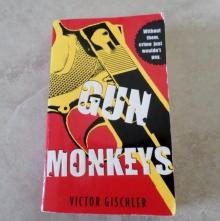 Gun Monkeys
Gun Monkeys Go-Go Girls of the Apocalypse
Go-Go Girls of the Apocalypse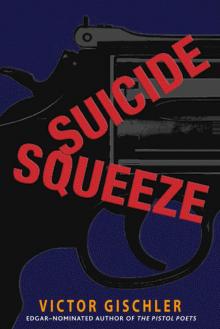 Suicide Squeeze
Suicide Squeeze The Pistol Poets
The Pistol Poets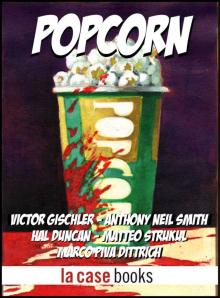 POPCORN
POPCORN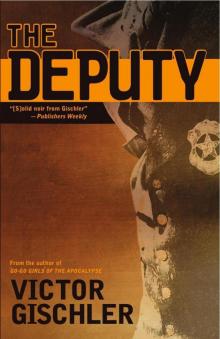 The Deputy
The Deputy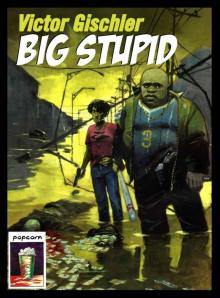 Big Stupid (POPCORN)
Big Stupid (POPCORN) Pistol Poets
Pistol Poets Shotgun Opera
Shotgun Opera The Tattooed Duchess (A Fire Beneath the Skin Book 2)
The Tattooed Duchess (A Fire Beneath the Skin Book 2) Ink Mage
Ink Mage Go-Go Girls of the Apocalypse: A Novel
Go-Go Girls of the Apocalypse: A Novel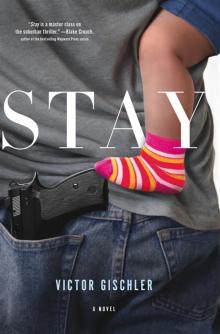 Stay
Stay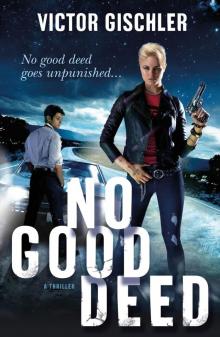 No Good Deed
No Good Deed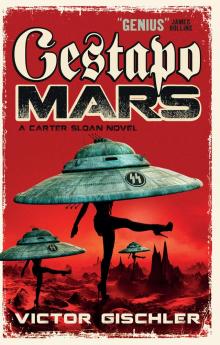 Gestapo Mars
Gestapo Mars A Painted Goddess
A Painted Goddess